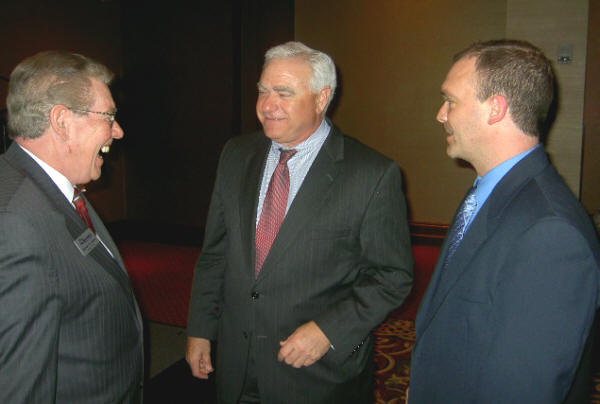 Chamber President Mike Seward, left, and Vice Chair Max Holman, right, greet U.S. Chamber economist Dr. Martin Regalia.
Chamber President Mike Seward, left, and Vice Chair Max Holman, right, greet U.S. Chamber economist Dr. Martin Regalia.
Economy to Begin Growing by End of Year, Predicts Chamber Expert
Dr. Martin Regalia Negative on Tax Increases, Government Spending
April 16, 2009
By: Dave Rogers
The United States economy will begin to grow again by the end of this year, predicted Dr. Martin Regalia, chief economist of the U.S. Chamber of Commerce.
Dr. Regalia spoke to a crowd of about 150 members of the Bay Area Chamber at a luncheon Thursday in the DoubleTree Hotel - Bay City Riverfront.
The program was introduced by Mike Debo, Chemical Bank executive, and Max Holman, president of Bay Cast, Inc. and Chamber vice chair, introduced Dr. Regalia, whose appearance here he had arranged.
Chamber President Michael Seward gave special recognition to the Leadership Bay County group, noting their "class project" is entitled "Plant A Seed - Grow a Community." The 22 members of the group will conduct a school beautification project and ask businesses twice a year to schedule a day of volunteerism at their adopted school. Kickoff of the project is set May 11 at Linsday Elementary.
The speaker, rated among the top 10 economists in the nation by USA Today newspaper, is optimistic about the economy over the next two years but pessimistic about the effects of government spending and tax increases afterward.
"An economy packed with liquidity could overheat," he said, citing statistics that President Obama's budget calls for too much spending and a debt overload.
"The budget is mind-boggling; I couldn't find anything about it I liked," said the economist, adding: "Debt rising to 82.4 percent of Gross National Product (GNP) is more than that incurred by the previous 43 Presidents combined."
He urged Congress to clamp down on the budget proposals noting, however, that the House and Senate appear to be basically in line with the President's thinking on budgetary matters.
Dr. Regalia called the current downturn "one of the worst since the Great Depression" that started in 1929, noting that there have been 16 straight months of economic decline since December 2007.
However, he looks for the stabilization and stimulus programs to take effect and help the economy to begin to grow by the end of this year.
After perhaps a year of resumed growth created by government incentives, Dr. Regalia predicted trouble beginning at the start of 2011 caused partially by over-regulation of financial markets.
Beginning with 11 percent government spending under the Bush Administration, "wealth has eroded at an alarming rate," said the economist. He said $12.7 trillion dollars has "disappeared -- evaporated, in the value of stocks and homes."
The big question is: "When will the housing market begin to settle, at least not get any worse?" he asked. The economist noted that buyers meeting minimum credit requirements, including 20 percent down payments, can still get mortgage credit.
Among other observations by Dr. Regalia:
Renegotiation has worked to stem additional home foreclosures;
Little investment has occurred for three years because the customer base has been eroding;
There is no justifiable reason to build excess plant capacity since it takes quite a while to run the inventory cycle; in his opinion the Obama Administration threw in a lot of inventory incentives two years too early; and
Surveys of confidence levels of business are all very negative.
Dr. Regalia was critical of the government raising taxes on high income individuals.
He said he "hopes to see real leadership" out of Washington "to create a more beneficial feeling" in the country so consumers will spend and buy.
Strangely, there have been some positive effects of the downturn, he opined: "As the economies of the rest of the world dropped, the dollar strengthened." He called the U.S. dollar "the safest investment on the face of the earth," but predicted gradual dollar weakness as the economies of the rest of the world improve.
And the President's "enormous increases in spending and debt levels have to be funded and in the long run will probably drive down the dollar."
Summing up the situation with banks, Dr. Regalia said: "the bank that never makes a bad loan isn't doing its job." Without taking risks, banks are under performing. Banks need to see more certainty about what the government wants, he said. "A mixed message creates national uncertainty; we can't fault the banks for not being mind readers."

